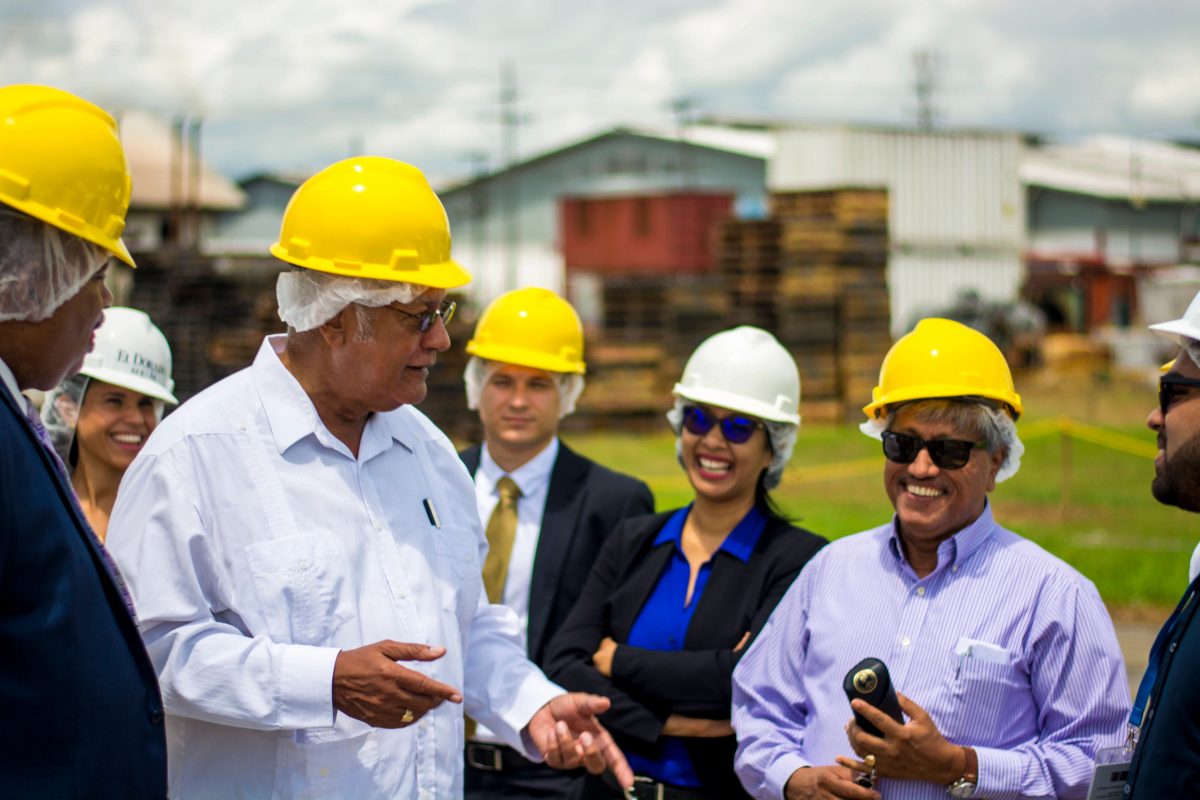
Agriculture Minister Noel Holder (second from left) and DDL Chairman Komal Samaroo (second from right) during the 2018 visit.
April 26 ,2021
Scheduled to be commissioned in June, Demerara Distillers Limited (DDL) will be importing milk powder for its pasteurised milk processing plant until this country has an “organized dairy sector”, Chairman Komal Samaroo says.
“We are not set up for local milk because there isn’t an organized dairy sector here in Guyana, so no, we will not be using local cow’s milk. We will import the reconstituted milk for that,” Samaroo told Stabroek News when asked for an update on the project.
“Well, until there is that organised dairy sector,” he added, when asked about possibility of switching in the future.
With Guyana’s annual import of milk products at over US$25M, the company had in 2018 said that it was looking at ways to partner with government to bolster the local dairy industry.
In October of 2018, a joint release from DDL and the then APNU+AFC government had said that the two had agreed to examine the implementation of a private/public partnership to develop the local dairy industry to provide for milk and dairy products.
The partnership, the two sides had stated, would also aim to expand local juice production, with the Ministry of Agriculture embarking on a programme to encourage market-driven agriculture.
Former Minister of Agriculture, Noel Holder had said that the government, through the Guyana Livestock Development Authority, would have provided the required expertise on artificial insemination, embryo transplant techniques, pasture management, farm development and milk collection activities.
“There are synergies for us to work together and to access the needed resources through international agencies such as the World Food Programme,” said Holder, a former head of the long defunct LIDCO milk plant. He had said that DDL with its technical, marketing and management expertise was best suited to work with Government to pursue the production of milk in Guyana.
Samaroo had stated that his company was open to pursuing a partnership with the Government and that they would continue to engage in moving the process forward, as part of the company’s diversification plans.
The meeting had also seen a presentation by a visiting team from Tetra Pak, a Swiss headquartered company with which DDL was finalizing an agreement for the design and supply of a new packaging plant to be installed the next year at Diamond. The presentation also encompassed a system for the effective collection of fresh milk from dairy farmers.
DDL and Tetra Pak finalised the agreement in 2019 and had announced a $4 billion Tropical Orchard Products Company (TOPCO) expansion project.
The plant would process both milk and fruits and last year the company took this newspaper on a tour of the facility which had suffered setbacks because of COVID but was nearing completion.
Samaroo said that the pasteurised milk processing will begin this June as he too pointed out the delays. “We are scheduled to start …in June because as you know, there were some delays,” he said.
He explained that the current plant is designed for reconstituted milk processing and not that of local cow’s milk. “We are not set up for local milk processing,” he said. The powdered milk is mixed with water and goes through a special pasteurising processing to eliminate bacteria and achieve the desired taste and properties.
DDL’s facility is unlike that of the local pasteurised milk bottling facility that Canada-based Guyanese Omkaar Sharma will be establishing in Region Five as his would be using cow’s milk supplied by local cattle farmers.
Under the umbrella of the Amaya Milk Company, Sharma had said, the milk processing facility will be underpinned by the advocacy of renewables and incentivising locals.
Already, he has an agreement with five large-scale cattle farmers in Region Five and they have promised to deliver 100 gallons of fresh cow’s milk every day to his plant. He says that as sales pick up, he hopes that more farmers buy in to the initiative and he will gain additional suppliers. The 100 gallons per day requirement, he explained, was the minimum processing capacity as it “doesn’t make any sense to start with less than 100 gallons per day.”
“Currently, there is no financial incentive for local cattle farmers for milk. Over time, if they know there is a market and demand, more will want to join. You will also see them improve the standard of not only feeding of the cows but overall sanitization,” he said.
In terms of direct job opportunities at the plant, he said it will only be about 15 persons needed but as it expands more will be employed.

